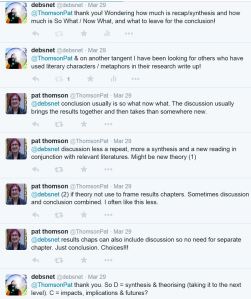Don’t believe what your eyes are telling you. All they show is limitation. Look with your understanding. Find out what you already know and you will see the way to fly. ~ Richard Bach, Jonathan Livingston Seagull
Since beginning my PhD two and a half years ago, I have plugged away at my thesis, chipping at it bit by agonisingly small bit, sometimes having to retrace my steps or throw out whole sections of work. But it has progressed through dogged persistence, slow laborious work and a measure of creative problem solving. I have even found it to be wonderful celebrated ‘me time’ as I explained on the PhD Talk blog.
Yet as my big book pushed towards 100,000 drafted words, I arrived at the discussion chapter and … duhm duhm daaahhhhhhm … suddenly I screeched to a stop, paralysed by fear. After fairly consistent, if often brain-bending, progress, I had come to a standstill. Up until this point, my metaphors of PhD candidature had served to propel me forward through even the biggest challenges and hard-to-hear feedback. My PhD had been an elephant I had to eat one deliberate bite at a time, or a sculpture I needed to craft carefully, or a journey in which I put one footstep in front of the other (another nice metaphor is this one of the PhD as swimming). Yet, despite my supervisors’ assurances that the discussion chapter was just one more eatable bite, one more takeable step, I was immobilised.
Matt Might’s illustrated definition of the PhD, which I had initially found grounding, now seemed terrifying. While it demonstrated that a PhD need only push the boundary of knowledge a teeny tiny bit, it also reminded me that a doctorate is all about having an original contribution to the body of knowledge. An. Original. Contribution. Which. Pushes. Bends. And. Remakes. The. Boundary. Of. Knowledge. And the discussion chapter is where I need to – as Inger Mewburn (the Thesis Whisperer) says – not just state my findings but explain what my findings mean.
So after two and a half years of reading (and reading and reading), interviewing, analysing and writing (and writing and writing and writing), I found myself at a point at which I needed to explain what it all means. And to have the (as Inger puts it) scholarly confidence to assert my research as having an original and worthwhile contribution.
In my paralysis of PhDcrastinating I found Emma Burnett’s blog posts which helpfully explained how she planned to approach her discussion chapter and also what she actually did. These kinds of explications by PhD candidates are useful material for others as they approach different stages of thesis wrangling.
Pat Thomson, my go-to blogger on all things academic writing, describes the discussion chapter through the metaphor of taking flight. She explains that the discussion chapter is the place to “be your own expert, to fly where no other researcher has flown before.” No pressure. Her metaphor of discussion-chapter-as-taking-flight reminded me of Richard Bach’s allegorical novella Jonathan Livingstone Seagull in which the non-conformist seagull Jonathan works tirelessly, often on his own and sometimes as an outcast, towards a kind of flight never before achieved by any seagull. His passion-driven, sometimes lonely and relentlessly-perfectionist journey to ultimate flight could certainly be a metaphor for the PhD narrative (although as Pat Thomson reminds us, the PhD is not a lone journey, but collaborative work).
In a useful Twitter conversation, Pat explained to me that the discussion chapter is a synthesis and interpretation of findings which takes them to a new theoretical level. Discussion is not a repeat or recap, but a presentation of a new reading of the research which links findings to literatures. As Pat’s blog post explains, this is the place for interpretation and theorisation. Taking it to the next level. As she suggests, it’s the time to earn the ‘Philosophy’ part of the PhD.
* * *
Eventually I found a mental space in which I could put some words to the page (just one word in front of the other, I told myself; get it down), and I got started on the … duhm duhm daaahhhhhhm … discussion chapter.
Firstly, I went back to my research questions, which had emerged from the literature review, and used these as a frame for my discussion. Then I went back into my literature chapter and pulled out the threads which related to those research questions, especially those areas in which I had identified gaps or areas for further embellishment or new perspectives. Then I went back to my data (in my case, three chapters of storied interview data from three different groups). While the end of each of my data chapters included some synthesis and interpretation of that data set, the discussion chapter was the time to bring all the threads – all literature and all data – together. My intention was to identify clearly what I had found and how this was related to existing literatures. After writing an initial draft which was more summary than analysis or insight, I left it. It was a start.
Now, after giving myself permission to take a break and finding some mental space and clarity through travel, I have returned to the chapter. As I write I am asking myself: What does my data mean (within the parameters of the research questions)? What established trends are affirmed or challenged by my study? What findings are surprising? What from my research is new in terms of, or absent from, the literatures in my area?
The chapter is still in draft form, but instead of standing still, mute and frozen, I am flapping my wings with a sense of how and where I’m going. Soon enough I’m sure I will take flight.
(For an update on how my approach to the discussion chapter evolved, the follow up is here.)
He was not bone and feather but a perfect idea of freedom and flight, limited by nothing at all. ~ Richard Bach, Jonathan Livingston Seagull




Where one hobbles up the mountain by the cane of reason, another soars effortlessly on the wings of faith. (I trust it’s coming…)
LikeLike
Wind approaches, be ready…
LikeLike
Pingback: Front load your work. Be an expert. Own your contribution. | the édu flâneuse
I just finished writing a class paper that is a mini version of my diss. The discussion chapter was the slowest to flow out of my pen. These insights are so useful, thank you! I’m glad there’s always help out there !!
LikeLike
Ali, I also find that reading the approaches of others shines some light on my own process. I’m glad it was useful for you.
LikeLiked by 1 person
Pingback: Research as conversation: contemplating Wicked and the Mona Lisa | the édu flâneuse
Pingback: Revising writing: Lessons from the PhD thesis | the édu flâneuse
Pingback: Webs & chrysalises: Metaphors for learning & connection | the édu flâneuse
Pingback: What I now know about the doctorate: Illuminating the PhDarkness | the édu flâneuse
Pingback: Doing PhD revisions: The last thesis embrace | the édu flâneuse
Pingback: Liquid becoming: Reflections on post-PhD identity and momentum | the édu flâneuse
Pingback: Guest Post from Deborah Netolicky. Heutagogical and transformational: Journeys of discovery, discomfort and breakthrough | Heutagogy Community of Practice
I just thought you might like to know that I have links to these posts in your blog at the start of my discussion chapter, and now that I am also staring, somewhat paralysed and terrified, at page one of this chapter, this is my regular go-to page. Very helpfully written – thank you!
LikeLike